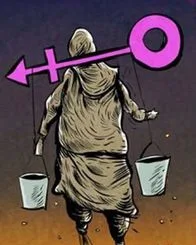 |
| I will probably never have to shop for leather hiking boots again. |
When you have to buy something, choosing the quality and durable alternative means you may never have to buy that thing again. For those of us that don't like shopping much, that is a very attractive situation.
One of the best ways to make things last is to acquire quality things. It may cost more to begin with, but over the long run they outlast their cheaper counterparts. Also good would be buying items that you can repair if needed, which will also make things last a long time.
Good quality items, along with gentle use and proper maintenance, could conceivably last several lifetimes. A good set of hand tools, or a cast iron frying pan fall into this category.
Other items may not technically last a lifetime, but in a world of disposable this, and throw away that, having something that lasts a long time deserves an honorary inclusion. Sturdy clothing would fall under this category.
Here are 10 practical and durable items on my "Buy It For Life" list:
- Cast iron frying pan - we are using one handed down through 3 generations.
- Wood cutting board - cared for properly, it can last a lifetime
- Binoculars - essential bird watching tool that if cared for will bring birds into focus for many years.
- Sturdy furniture - cheap furniture is not worth buying. I prefer older, second hand sturdy stuff.
- Pots and pans - don't let them sit empty on a hot burner and everything will be fine.
- Stainless steel thermal mug - indestructible items that keep liquids hot or cold longer.
- Basic tools/garden tools - buy good stuff and enjoy a lifetime of gardening
- double-edged safety razor - bomb proof, and the blades are waaay cheaper than modern razors.
- Guitar - WIlly Nelson has had his guitar for over 45 years.
- Leather hiking boots - my first pair lasted decades, and the next will probably be my last.
These frugal choices are the opposite of the throw-away economy. They reduce waste, and save money in the long run. Plus, old things take on a personality, character, and beauty of their own, as in the Japanese tradition of wabi-sabi.
I have found that it is usually better to look for things like longevity, energy efficiency, repairability, and low total cost of ownership when making a purchase, instead of just what is least expensive.
The frugal choice may not be the cheapest choice, but instead the more expensive option that may never have to be bought again.
What are some things on your "Buy It For Life" list?
I have found that it is usually better to look for things like longevity, energy efficiency, repairability, and low total cost of ownership when making a purchase, instead of just what is least expensive.
The frugal choice may not be the cheapest choice, but instead the more expensive option that may never have to be bought again.
What are some things on your "Buy It For Life" list?


























